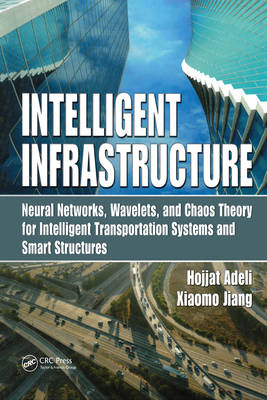
- Retrait gratuit dans votre magasin Club
- 7.000.000 titres dans notre catalogue
- Payer en toute sécurité
- Toujours un magasin près de chez vous
- Retrait gratuit dans votre magasin Club
- 7.000.0000 titres dans notre catalogue
- Payer en toute sécurité
- Toujours un magasin près de chez vous
Intelligent Infrastructure
Neural Networks, Wavelets, and Chaos Theory for Intelligent Transportation Systems and Smart Structures
Hojjat Adeli, Xiaomo JiangDescription
Recent estimates hypothesize that the US will need $1.6 trillion dollars for the rehabilitation, replacement, and maintenance of existing infrastructure systems within the next 20 years. Presenting a new vision and way of designing and managing the civil infrastructure of the nation, Intelligent Infrastructure: Neural Networks, Wavelets, and Chaos Theory for Intelligent Transportation Systems and Smart Structures presents the foundations of intelligent infrastructure. It presents novel technologies, methods, and detailed computational algorithms for creation of smart structures and intelligent freeways.
This book crosses the two disciplines of structural engineering and transportation engineering and provides a unique treatise for attacking and solving some of the most complex and intractable problems encountered in the emerging fields of smart structures and intelligent transportation systems. It demonstrates how some of these problems can be solved effectively through ingenious integration of several different computing paradigms including chaos theory (based on nonlinear dynamics theory), wavelets (a signal processing method), and three complementary soft computing methods: fuzzy logic, neural networks, and genetic algorithms.
Adeli and Jiang discuss multidisciplinary methodologies for health and monitoring and nonlinear active control of tall building structure subject to dynamic loading such as those due to winds or earthquake. Delineating an approach to infrastructure system engineering and management that is both modern and futuristic, the authors explore the advanced computing technologies that will play an important role in the creation of an effective smart structure technology.
Spécifications
Parties prenantes
- Auteur(s) :
- Editeur:
Contenu
- Nombre de pages :
- 456
- Langue:
- Anglais
Caractéristiques
- EAN:
- 9780367386719
- Date de parution :
- 10-10-19
- Format:
- Livre broché
- Format numérique:
- Trade paperback (VS)
- Dimensions :
- 175 mm x 251 mm
- Poids :
- 1088 g

Les avis
Nous publions uniquement les avis qui respectent les conditions requises. Consultez nos conditions pour les avis.






